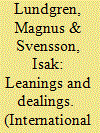| Srl | Item |
| 1 |
ID:
133153


|
|
|
|
|
| Publication |
2014.
|
| Summary/Abstract |
Two characteristics of mediators - bias and leverage - are discussed intensively in the research on international mediation. However, whereas bias and leverage have been examined in mediation by states, relatively little is known about their role in mediation by international organizations (ios). This study provides new ways of conceptualizing io bias and leverage and utilizes unique data to measure the impact of io bias and leverage on mediation outcomes. Exploring all cases of civil war mediation by ios in the period 1975-2004, we find that ios where member states provide support to both sides in a conflict outperform ios whose member states remain disinterested. ios with significant trade leverage also increase the likelihood of mediation success. The study demonstrates that ios rarely have a neutral relationship to civil war combatants, that mediation by ios is laden with member state interests, and that such interests shape outcomes.
|
|
|
|
|
|
|
|
|
|
|
|
|
|
|
|
| 2 |
ID:
162499


|
|
|
|
|
| Summary/Abstract |
Since the EU has expanded its common security focus in the 1990s, this important regional organisation has become the most frequent mediator in low-level civil conflicts worldwide. Under what conditions is the European Union (EU) likely to become involved in mediation in civil conflicts? Is the participation in mediation only explained by the EU's bias toward its near abroad, or is the EU more strategic? Some scholars have suggested that the EU's regional bias for its near abroad is the key explanation for the onset of EU mediation, but we propose that the reality of EU mediation presents a more nuanced story. We posit three explanations based on mediator bias: regional bias, economic bias, and normative bias. Overall, we argue that the EU will mediate in civil conflicts that are in its near abroad, but also where the EU has economic bias and where the EU can exercise its normative power in highly intractable conflicts. We test our hypotheses using statistical analysis of the UCDP low-level civil conflicts data from 1993 to 2004 and Civil War Mediation data from 1974 to 2005. We find strong support for our hypotheses, determining key factors that reveal the EU's strategic onset of mediation.
|
|
|
|
|
|
|
|
|
|
|
|
|
|
|
|
| 3 |
ID:
165678


|
|
|
|
|
| Summary/Abstract |
This research examines the effect of mediators’ characteristics on mediation outcomes. In the current study of international mediation, one group of scholars argues that biased mediators with a considerable interest at stake in the dispute are usually effective. Others stress that mediator neutrality is a precondition for mediation to be successful. To test these claims, this study evaluates the Philippines’ qualifications as a mediator for the Borneo confrontation between Indonesia and Malaya in the 1960s. Although the Philippines’ strong ties to both disputants qualified it as an impartial mediator, its ongoing dispute with Malaya over Sabah transformed the Philippines into a biased/interested mediator in the Borneo confrontation. This research illustrates how effective the Philippines was in mediating the Borneo confrontation. It also sheds light on the possible futility of South Korea’s involvement as a third party in the People’s Republic of China-Japan territorial dispute.
|
|
|
|
|
|
|
|
|
|
|
|
|
|
|
|